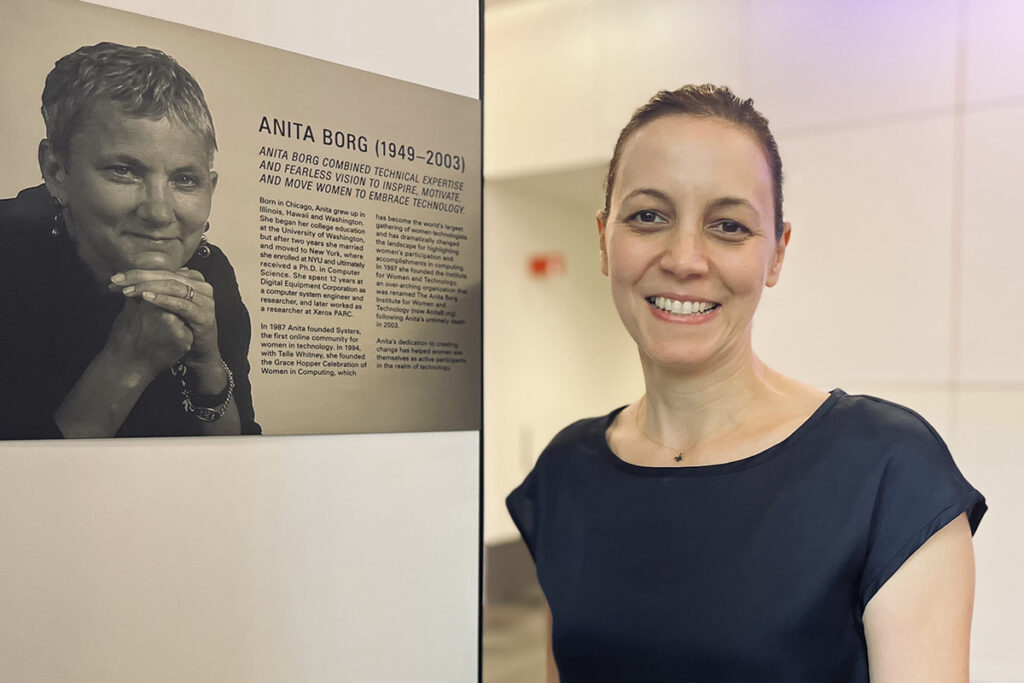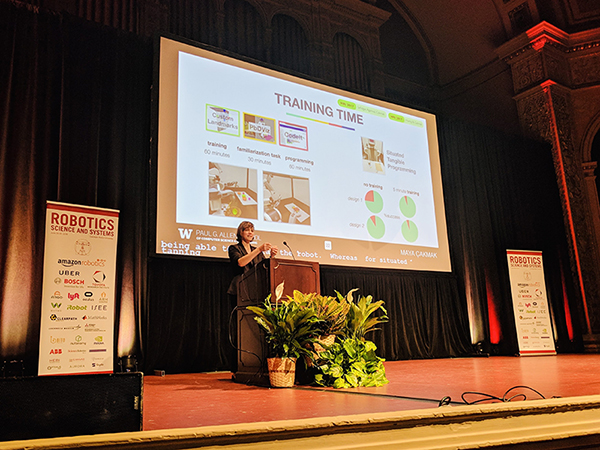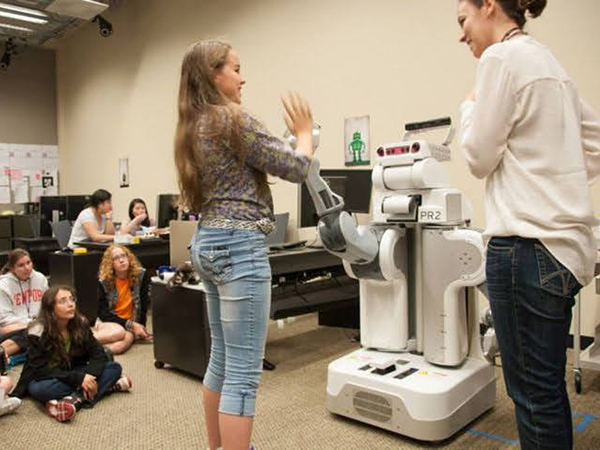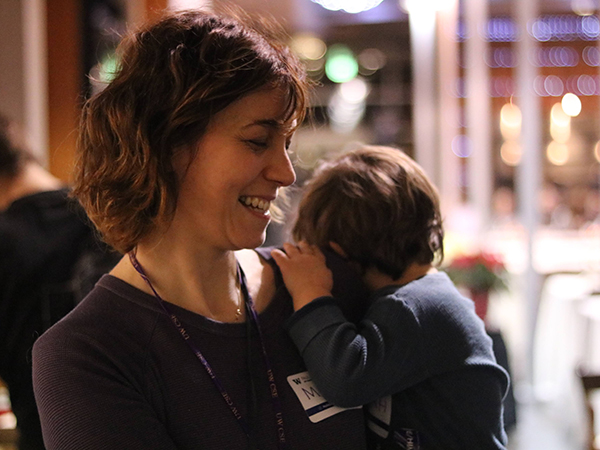
For Allen School professor Maya Cakmak, the future of robotics hinges on the human element. Since the early days of her research career, Cakmak has been leveraging advances in human-computer interaction and accessibility to shift robotics research from primarily technology-centric approaches toward a more user-centric approach. She is also known for putting people first through her support for programs and policies aimed at increasing participation in computing by women and people with disabilities. For her efforts, the Computing Research Association’s Committee on Widening Participation in Computing Research (CRA-WP) recently recognized Cakmak with its 2022 Anita Borg Early Career Award — named in honor of another woman in computing who wasn’t afraid to break new ground and lead by example.
Cakmak holds the Robert E. Dinning Career Development Professorship in the Allen School, where she directs the Human-Centered Robotics Lab. There, she and her collaborators develop robots that can be programmed by users with diverse needs and preferences to assist with everyday tasks — in her own words, “empowering users to decide what their robots will do for them.”
Even before she joined the University of Washington faculty in 2013, Cakmak had already begun building a reputation in robotics circles for her human-centric approach. As a Ph.D. student at Georgia Tech, Cakmak showed that many data-driven methods for programming by demonstration were ill-suited to novice users, proposing instead to employ interaction-driven approaches that incorporate user studies — a novel idea at the time that has since entered the mainstream. She also was an early evangelist of active learning in robotics, which enables robots to acquire new knowledge and skills via queries instead of just passively receiving data from humans.

After her arrival at the Allen School in 2013, Cakmak sought to expand end-user programming capabilities for robots beyond conventional programming by demonstration by drawing upon techniques from HCI. She also pursued new connections between robotics and programming languages, uniting two of the Allen School’s strengths to usher in a new and growing area of interdisciplinary research. For example, Cakmak and Ph.D. student Sonya Alexandrova teamed up with faculty colleague Zachary Tatlock in the Programming Languages & Software Engineering (PLSE) group on RoboFlow, an intuitive visual programming language to enable users to program robots to perform mobile manipulation tasks in various real-world environments. She also worked with then-student Justin Huang (Ph.D., ‘18) and Allen School alum Tessa Lau (Ph.D., ‘01), who at the time served as CTO and “Chief Robot Whisperer” at Savioke, Inc., to create a rapid programming system for mobile service robots. That system, which the team dubbed CustomPrograms, featured a cloud-based graphical interface to support the rapid prototyping and development of custom applications by experts as well as inexperienced programmers.
Cakmak and Huang followed that up with Code3, a suite of user-friendly tools for perception, manipulation and high-level programming that enables rapid, end-to-end programming of robots such as the PR2 and Fetch to perform mobile manipulation tasks. As with many of her projects, Code3 was designed to appeal to experts and novice users alike. In 2016, Cakmak received a CAREER Award from the National Science Foundation for her project titled “End-user programming of general-purpose robots” to continue this line of research.
According to her Allen School robotics colleague Dieter Fox, Cakmak’s human-centric approach has been hugely influential within the robotics community.
”Human-robot interaction has grown tremendously over the past decade, and Maya has been at the forefront of the field,” said Fox, director of the UW’s Robotics and State Estimation Lab and senior director of robotics research at NVIDIA. “Her work has also had real-world impact through her collaborations with multiple robotics companies that ship their robots with end-user tools that she developed.”
Fox knows all about the potential impact of such academic-industry collaboration. He and his colleagues at NVIDIA recently teamed up with Cakmak to develop new capabilities in human-robot handovers — an essential skill for robots to safely and reliably assist humans with everyday tasks. The team’s system, which demonstrated smooth human-to-robot handover of arbitrary objects commonly found in people’s homes, earned the Best Paper Award in HRI at the International Conference on Robotics and Automation (ICRA 2021). Cakmak also collaborated with Anat Caspi, director of the Allen School’s Taskar Center for Accessible Technology, and researchers in the Personal Robotics Lab led by professor Sidd Srinivasa to explore user preferences and community-centered design principles to inform the development of robot-assisted feeding systems for people with mobility impairments.

Whatever problem she aims to solve, Cakmak has been eager to take her cue from the people who have the potential to benefit most from her work.
“I deeply care about the relevance and usefulness of my research,” Cakmak explained in her Early Career Spotlight talk at the 2018 Robotics: Science & Systems (RSS) conference. “To that end, I try to evaluate systems I develop with a realistic and diverse set of tasks, I put these systems in front of real potential users with diverse backgrounds and abilities, and I take every opportunity to demonstrate and deploy them in the real world.”
Cakmak’s contributions to accessibility go far beyond her projects and papers; she is also a vocal proponent of making the act of research — and the conferences and other events where research careers are made — more inclusive of people with disabilities and women. This includes making it easier for women who are new mothers to participate, inspired by her personal experience. In one specific example, Cakmak successfully lobbied for changes in one organization’s reimbursement policies to cover childcare expenses for invited speakers.
“When I had my first child, I received a transitional grant from the UW ADVANCE Center for Institutional Change to cover expenses of taking my infant along for work travel,” Cakmak said. “Continuing to go to conferences was critical for me to stay active in my research community and help my graduate students network. But it did more than that. Colleagues would often approach me, not just to play with the baby but to ask questions about the logistics of taking your baby to a conference or how to manage starting a family while being on tenure-track. Many were amazed to hear about the ADVANCE grant and went back to ask for similar initiatives at their institutions.
“In an academic career system where young parents are disadvantaged, we are learning how to make it work from one another, while also pushing for positive institutional change,” she continued. “This is why representation matters so much. We owe many privileges we now take for granted to the hard work of those who were disadvantaged back in the day.”
Back on campus, Cakmak served as a co-principal investigator on the National Science Foundation-funded AccessEngineering initiative to incorporate topics such as universal design into engineering courses and to make labs and maker spaces accessible to students with diverse abilities. In an effort to engage more people with disabilities in computing and, in particular, robotics, Cakmak designed and taught a course for high school students over multiple summers as part of the UW DO-IT Center’s Scholars program. The course provided participants with hands-on experience in programming robots while encouraging them to think about how the field can help solve real-world problems. She developed a similar workshop for AccessComputing’s OurCS@UW program for undergraduate women with disabilities. Cakmak’s contributions inspired the DO-IT Center to recognize her with its 2021 Trailblazer Award.

In addition to these activities, Cakmak developed a seminar to provide second-year students with the foundational skills to participate in research. She also served as the UW faculty representative for the fourth cohort of the LEAP Alliance, a program that seeks to diversify the professoriate by supporting underrepresented students in pursuing academic careers. She also organized a rejuvenated RSS Women in Robotics Workshop, including raising funds for travel grants that enabled women roboticists from around the world to participate, and later supported its expansion to include researchers from other underrepresented groups.
“Maya is a stellar researcher who is a leader in her field of research, and she has dedicated an immense amount of time and effort to broadening participation by women and students with disabilities — directly and indirectly impacting many students,” Fox said. “I cannot imagine a more deserving recipient of the Anita Borg Award.”
The award includes a $5,000 prize, which Cakmak donated to the Allen School to support more women to pursue undergraduate research.
“This award means so much to me because it recognizes things I did in my career beyond my research that I did not expect to be recognized for,” Cakmak said. “I have been so fortunate to have many amazing role models, mentors, advocates, and supporters; I was just trying to pay it forward. I am honored especially because I have been so inspired by Anita Borg.”
Indeed, Cakmak’s work embodies Borg’s famous quote: “If we want technology to serve society rather than enslave it, we have to build systems accessible to all people — be they male or female, young, old, disabled, computer wizards or technophobes.”
Cakmak is the second Allen School faculty member to earn the Borg Early Career Award in the past five years, following professor Yejin Choi’s recognition in 2018. Allen School alumni Martha Kim (Ph.D., ’08), a faculty member at Columbia University; A.J. Bernheim Brush (Ph.D., ’02), Partner Group Program Manager at Microsoft; and Gail Murphy (Ph.D., ’96), Vice President of Research and Innovation and a faculty member at the University of British Columbia, are also past recipients of the award.
Congratulations, Maya!

